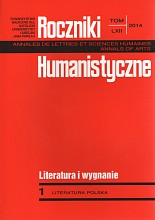Homo inrogatus – Emil Korytko w świetle listów do rodziny
Homo inrogatus – Emil Korytko in the Light of His Letters to His Family
Author(s): Joanna Wiśniewska-KrupaSubject(s): Literary Texts
Published by: Towarzystwo Naukowe KUL & Katolicki Uniwersytet Lubelski Jana Pawła II
Keywords: Emil Korytko; Romanticism; Romantic correspondence; Slovenian culture; enslavement; exile
Summary/Abstract: Emil Korytko remains an unknown person in Poland, although in the 1980s Bożena Ostromęcka-Frączak tried to make Poles familiar with his ethnographic-literary work. The author makes an attempt to look at the young man’s correspondence as a literary testimony documenting the vicissitudes of one of Polish political prisoners living in the first half of the 19th century. Those letters show that the authorities’ verdict making the convict leave his homeland becomes the direct reason of his defeat: 1. He is still supported by his family, which makes the relations between the son and his parents more complicated; 2. Emil finds carrying out his scientific-literary plans hard, and at the end of his life he does not even know if his work will be published; 3. The deplorable conditions Korytko lived under make him fall ill, and ultimately die. Moreover, his letters show that he consciously posed as a continuator of Zorian Dołęga-Mostowicz’s school, and a Romantic – Byronist, a lonely man, alienated from the world he lives in. Korytko’s correspondence that is not very well known to those who study Romantic literature, allows a better understanding the tragic vicissitudes of people whose life was to alarge degree affected by history of national independence movements.
Journal: Roczniki Humanistyczne
- Issue Year: 62/2014
- Issue No: 01
- Page Range: 11-21
- Page Count: 11
- Language: Polish

